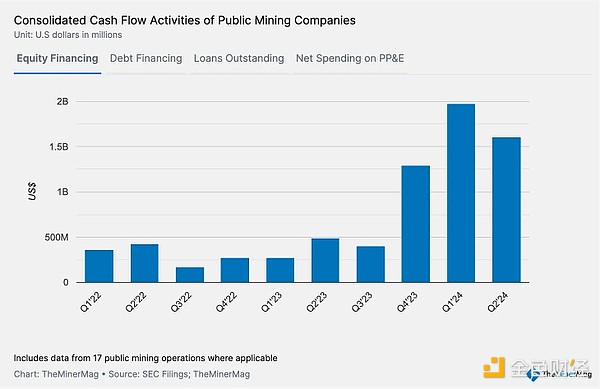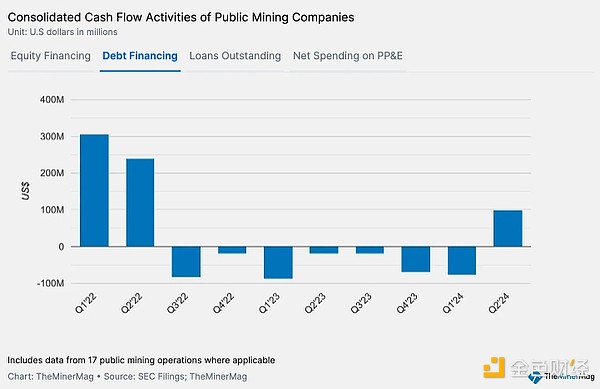Source: BlocksBridge Consuling; Translated by: Deng Tong, Jinse Finance
So far, 13 U.S.-listed mining companies have reported their second-quarter earnings , revealing a common theme: the need for cash flow is not slowing down. According to calculations by TheMinerMag, this urgency is driven by the state of the Bitcoin hash price, which has not generated meaningful cash flow after the halving. To alleviate this situation, some companies have also turned to debt financing again.
Nine of the 13 companies — Bitdeer, Bitfarms, Cipher, CleanSpark, Core, HIVE, Marathon, Riot, and Terawulf — raised a combined $1.25 billion through various equity offerings in Q2. Iris Energy, which has yet to report its earnings, reportedly raised $458 million through an on-market offering in Q2.
Based on this, TheMinerMag’s dashboard shows that large mining companies raised more than $1.6 billion through equity financing in the first quarter since the halving, and another $530 million in the third quarter so far.

While this figure falls short of the record of nearly $2 billion raised by public mining companies through equity offerings in the first quarter, it is noteworthy that convertible notes and asset-backed loans have increased again since the second quarter.
According to TheMinerMag’s dashboard, total debt financing for public companies has been negative since the bear market began in 2022, during the Luna crash, indicating their efforts to deleverage over the past two years.
While many companies continued to deleverage in the second quarter, their total debt financing turned positive as Hut 8 did not raise any funds through its equity offering but instead received $150 million in proceeds from Coatue notes.

Additionally, in the past week, we saw Marathon and Core Scientific issue convertible notes totaling $700 million. In Core’s case, the new convertible notes were part of a debt restructuring effort, replacing existing debt with notes with lower interest rates. For Marathon, the convertible notes were primarily used to purchase more Bitcoin from the market. CleanSpark disclosed in its second quarter filing that it had entered into a credit agreement with Coinbase, using Bitcoin as collateral. Canaan said it committed 530 Bitcoins in the second quarter to secure an 18-month term loan totaling $19.2 million.
This is almost surprising considering Bitcoin’s hashrate is as low as $43/PH/s (and that’s after today’s 4.2% difficulty adjustment).







